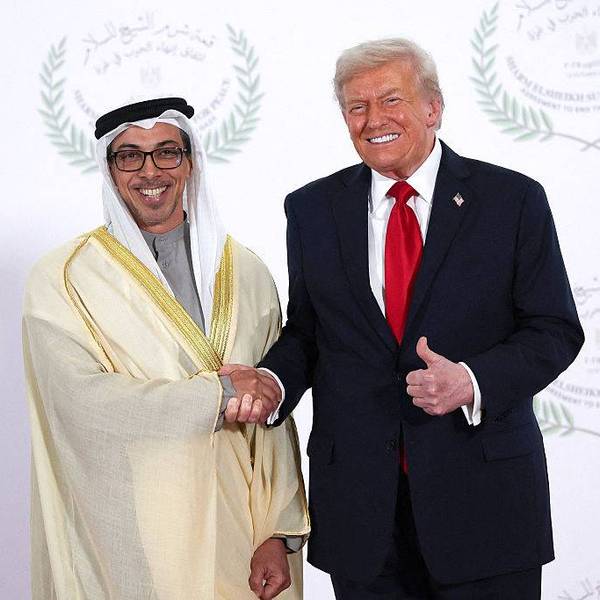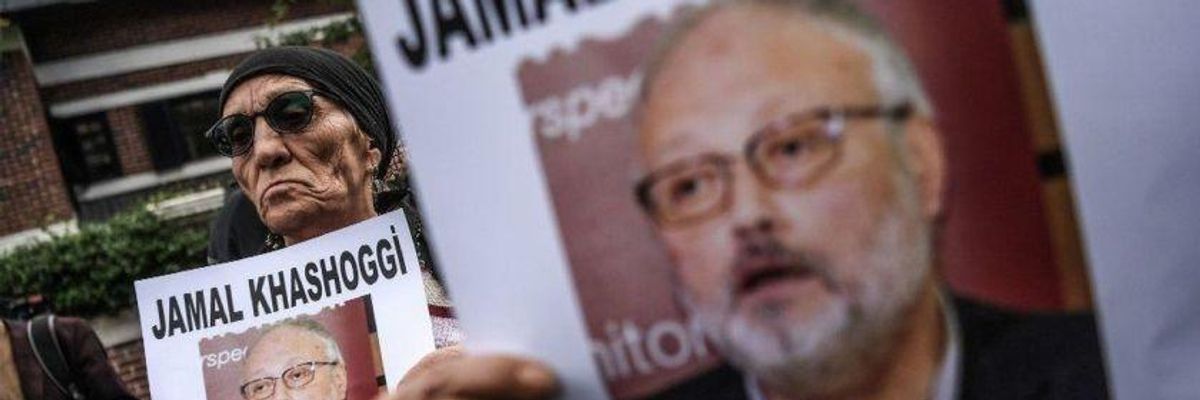Following the brutal killing of Saudi dissident and Washington Post contributor Jamal Khashoggi at Saudi Arabia's consulate in Istanbul, Turkey, one year ago, the Saudi government became something of a toxic commodity in American politics. Several high-profile lobbying and public relations firms dropped the Saudis as a client. Think tanks, including the Brookings Institution, severed ties with the Saudi government. Businesses pulled out of a major conference in Riyadh shortly after Khashoggi's death.
As the U.S. intelligence community, and the United Nations, were determining that Saudi Arabia was culpable in the killing, members of Congress demanded accountability. Democrats led the charge on a series of bills that would have halted U.S. arms sales to the kingdom and ended U.S. support for the Saudi-led coalition's disastrous war in Yemen. Republicans were outraged too. Sen. Lindsey Graham (R-S.C.), who claimed on "Fox & Friends" to have once been Saudi Arabia's "biggest defender on the floor of the United States Senate," announced shortly after Khashoggi's death that Saudi Arabia's de facto ruler, Crown Prince Mohammed bin Salman, "has got to go." The crown prince denies a role in Khashoggi's death; the U.N. sees credible evidence warranting further investigation.
Despite the backlash directed at the kingdom, the Saudis haven't faced serious consequences for the slaying of Khashoggi or its slaughter of civilians in Yemen. That is thanks in large part to one man -- President Trump. He has loudly and emphatically defended Saudi Arabia at every opportunity. According to a July House Oversight committee report, he recently considered giving Riyadh nuclear technology without appropriate safeguards to prevent nuclear proliferation, in part at the behest of the chair of his inaugural committee, Thomas J. Barrack Jr. He has also tweeted at least a fleeting willingness to go to war with Iran on Saudi Arabia's behalf following the attacks on Saudi oil fields, something the American public overwhelmingly doesn't support.
Trump's principal argument for siding with the Saudis has to do with the alleged economic benefits of U.S. arms sales to the kingdom. It all began during his May 2017 trip to Saudi Arabia, when he touted a purported $110-billion arms deal that would mean "jobs, jobs, jobs" for Americans. The deal itself, according to the Washington Post "Fact Checker," was considerably smaller than the administration claimed, with much of it composed of sales already approved under the Obama administration or speculative offers that would happen years from now, if ever. And a report from our organization, the Center for International Policy, found the president's claims of U.S. jobs tied to Saudi arms deals were greatly exaggerated--10 to 20 times the actual number.
The facts, however, have not prevented Trump from vetoing a series of congressional measures aimed at ending
U.S. military support and arms sales to the region.
While Trump appears to be the commander-in-chief of Saudi Arabia's public relations efforts in the U.S., he's far from alone. Even with several firms abandoning the influence machine the Saudi's had assembled before Khashoggi's killing, the Saudi lobby is still represented in the U.S. by more than 20 "K Street" firms, according to the Department of Justice . This includes influential operators such as Squire Patton Boggs and Brownstein Hyatt Farber Schreck--whom the Saudis paid over $1 million on Oct. 4, 2018, just two days after Khashoggi was killed at the Saudi consulate--and the McKeon Group, whose namesake, former Rep. Howard "Buck" McKeon (R-Santa Clarita), was once the chairman of the House Armed Services Committee.
Saudi Arabia has also dramatically increased funding to many of the lobbying and public relations firms that stayed with them post-Khashoggi. In fact, one firm--Qorvis Communications, the Saudis' longtime public relations gurus in America--received nearly $18 million from the kingdom in just the first three months after Khashoggi's death, more than most countries spend on all of their lobbying activities for an entire year. Washington lobbyists acting as agents of Saudi Arabia have also continued to give lavishly to House and Senate campaigns, in some cases on the same day they met with members of Congress or their staffs to discuss the kingdom.
All of this has served a critical function for the Saudi regime: maintaining enough support in Congress to ensure Trump's vetoes aren't overridden, which keeps the U.S. government from punishing the Saudis for Khashoggi's death.
President Trump's protection of Saudi Arabia is at best a temporary shield. Veterans, peace and human rights groups, and other interest groups have been pushing Congress to block U.S. military support for the kingdom by invoking provisions of the War Powers Resolution and making amendments to the National Defense Authorization Act. Human rights organizations also have pushed beneficiaries of Mohammed bin Salman's private charity -- among them the New York Public Library and the United Nations--to abandon their connection to the foundation, which the crown prince uses as a propaganda platform.
Yet, one year after Khashoggi's killing, and 4 1/2 years into the brutal Saudi-led intervention in Yemen, Congress and the president have yet to hold Saudi Arabia accountable. That cannot be allowed to stand. On the anniversary of Khashoggi's murder, we owe it to him to stand up to the Saudi lobby and the president, and once and for all punish the Saudi government for what it has done.




